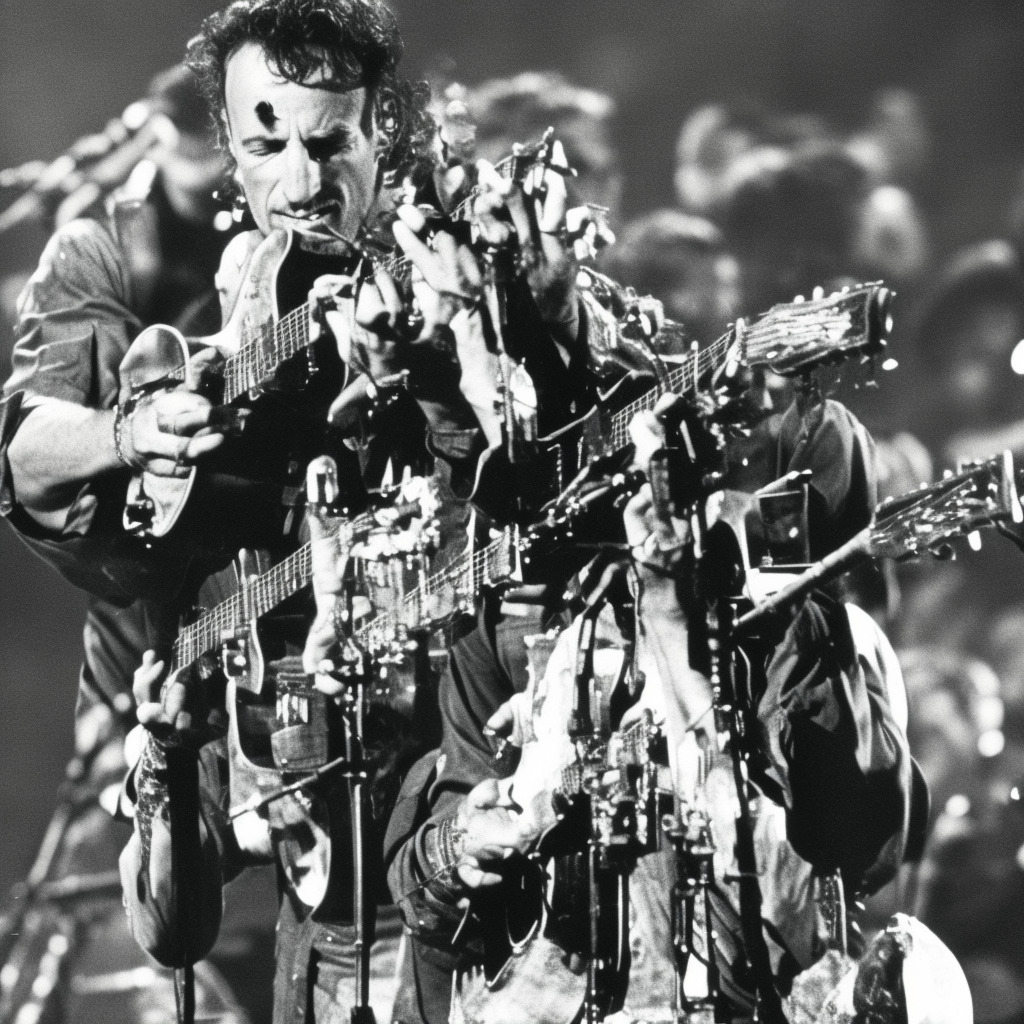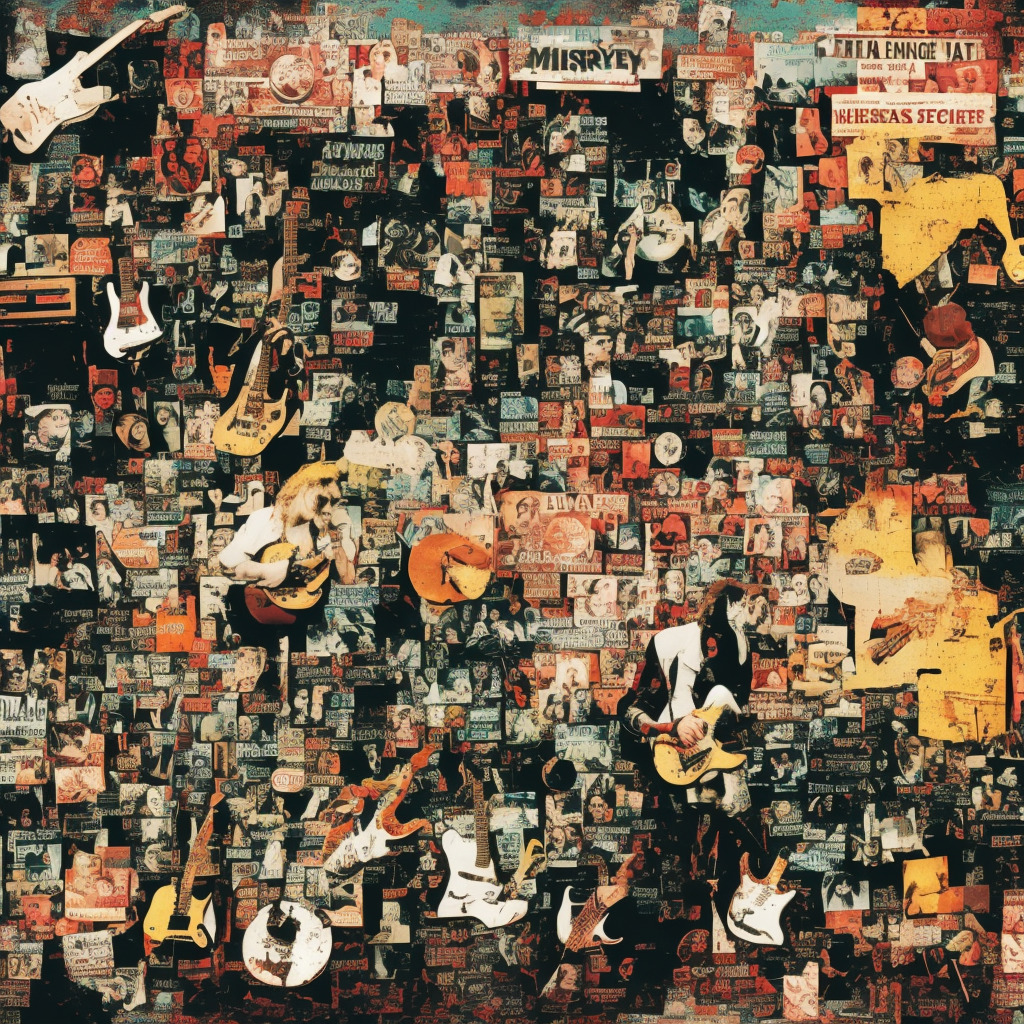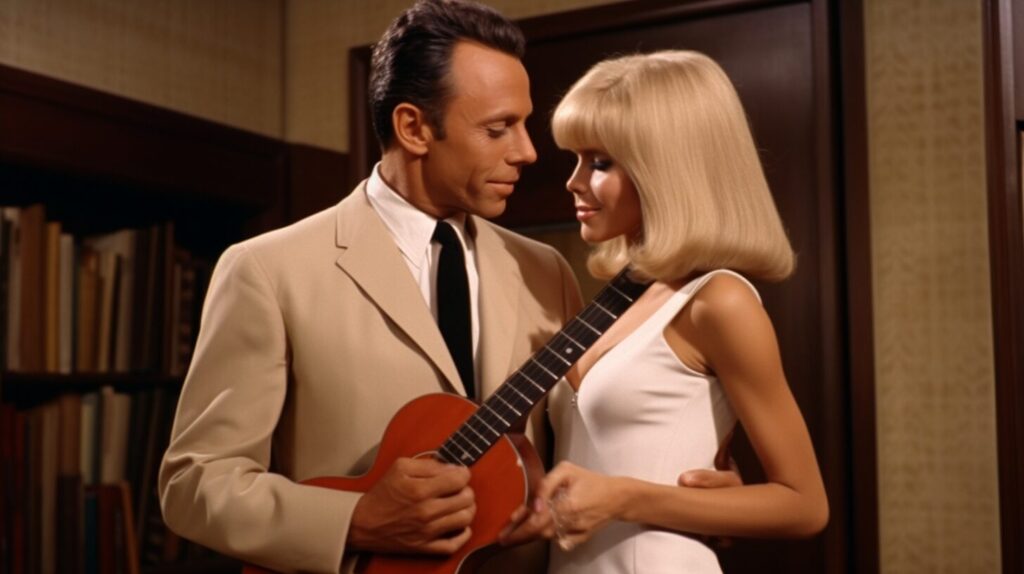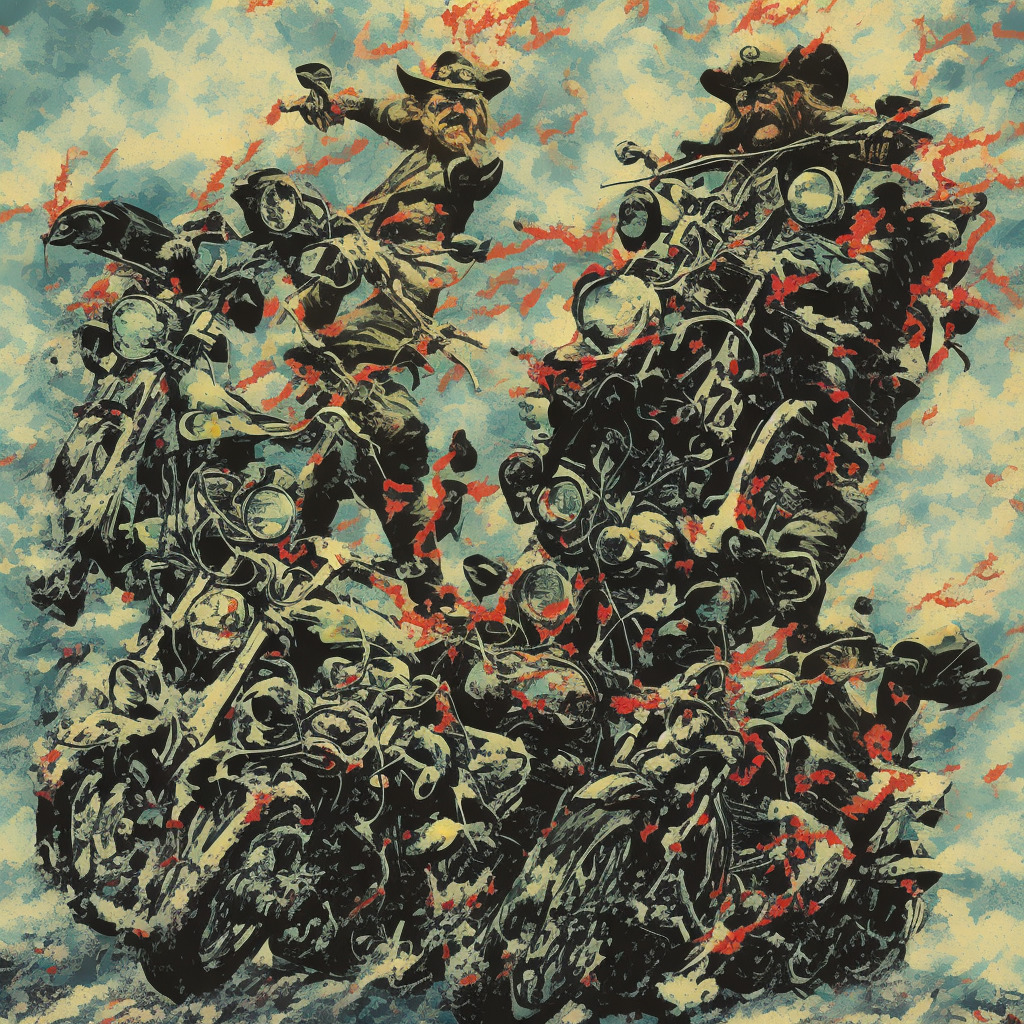A Trip Down Memory Lane: Bruce Springsteen’s Gem, “Atlantic City”
The Boss himself, Bruce Springsteen, has been serenading us with his heartfelt lyrics and captivating melodies for over four decades. Among numerous accolades and awards, including 20 Grammy Awards, two Golden Globes, and an Academy Award, there is no doubt this iconic musician is firmly etched in the annals of music history. It is no small feat to choose one song from such an incredible career, but few songs capture the essence of Springsteen’s storytelling prowess quite like “Atlantic City.”
Released in 1982 as part of Springsteen’s sixth studio album, “Nebraska,” “Atlantic City” is a significant departure from the bombastic, anthemic sound of his previous work. The album was recorded almost entirely on a four-track cassette tape, resulting in a raw, lo-fi sound that only amplifies the emotional heft of this song.
“Atlantic City” tells the story of a young man caught in a web of crime, love, and desperation, with the city’s casino lights as his backdrop. Springsteen’s choice to set his tale in Atlantic City was a sharp commentary on the city’s struggling economy and the effects it had on the lives of its residents. The song’s solemn, acoustic arrangement and haunting harmonica serve to underscore the bleak, yet hopeful tone of the lyrics.
Despite the undeniable quality of “Atlantic City,” the song was never released as a single, and as such, it never charted. Yet it has enjoyed a lasting legacy far beyond its commercial success. Over the years, it has been covered by various artists, such as The Band, Ed Sheeran, and Mumford & Sons. It has also found its way into numerous films and television shows, solidifying its place in popular culture.
One aspect of Springsteen’s career that has been met with some criticism is his tendency towards political activism. While this is evident in some of his work, it might be a stretch to say “Atlantic City” is explicitly political. Regardless, the sheer emotion and narrative strength of the track is undeniable and serves as a prime example of Springsteen’s skill as a songwriter.
In conclusion, “Atlantic City” is a testament to the extraordinary talent of Bruce Springsteen. Not only does it showcase his ability to evoke powerful emotions through his storytelling, but it also demonstrates his willingness to explore new sounds and themes. As a result, “Atlantic City” remains an essential part of Springsteen’s storied career, and a beloved classic for fans and critics alike.
Awards, Accolades, and Appearances: Spotlight on “Atlantic City”
Despite never being released as a single from the 1982 album “Nebraska,” Bruce Springsteen’s “Atlantic City” has worn various hats over the years, becoming a fan favorite and gaining recognition from music critics and various media platforms. The song ranked at number 37 in the Village Voice’s Pazz & Jop critics’ poll for the best songs of 1982. Later on, in 2014, Rolling Stone placed “Atlantic City” at number 67 in their list of “The 100 Greatest Bruce Springsteen Songs,” solidifying its place in Springsteen’s iconic discography.
In addition to the critical acclaim, “Atlantic City” has been featured in numerous films and television series. Some notable examples include the 1998 film “Snake Eyes,” where Nicolas Cage’s character listens to the song on his car radio, and HBO’s popular series “The Sopranos.” Springsteen’s masterpiece made its video game debut in 2010 when it was included in the soundtrack of the racing game “Blur.”
Cover versions of “Atlantic City” have graced the music scene since its release, with artists paying homage to Springsteen’s lyrical and musical genius. The Band, known for their work with Bob Dylan and their own legendary songs, recorded a version of “Atlantic City” for their 1993 album “Jericho.” Their rendition brought a rock-infused edge to the original folk sound of the track.
Alternative country singer-songwriter Hank Williams III also offered his take on “Atlantic City” in his 2011 album “Ghost to a Ghost/Gutter Town,” blending his distinctive style with Springsteen’s powerful storytelling. More recently, indie-folk artist Mumford & Sons released a live cover of the song as a B-side to their 2012 single “I Will Wait,” garnering praise from fans of both the original and the cover.
Through all these reinterpretations and appearances in popular culture, “Atlantic City” continues to maintain its status as a timeless Bruce Springsteen classic, resonating with new generations of listeners and solidifying its place in the annals of music history.
Delving into the Lyrics of “Atlantic City”
Well they blew up the chicken man in Philly last night
Now they blew up his house too
Down on the boardwalk they’re gettin’ ready for a fight
Gonna see what them racket boys can do
Now there’s trouble busin’ in from outta state
And the D.A. can’t get no relief
Gonna be a rumble out on the promenade and
The gamblin’ commission’s hangin’ on by the skin of its teeth
Well now everything dies baby that’s a fact
But maybe everything that dies someday comes back
Put your makeup on, fix your hair up pretty
And meet me tonight in Atlantic City
Well I got a job and tried to put my money away
But I got debts that no honest man can pay
So I drew what I had from the Central Trust
And I bought us two tickets on that Coast City bus
Now our luck may have died and our love may be cold
But with you forever I’ll stay
We’re goin’ out where the sand’s turnin’ to gold
So put on your stockin’s ’cause the night’s getting’ cold
And maybe everything dies, that’s a fact
But maybe everything that dies someday comes back
Now I been lookin’ for a job but it’s hard to find
Down here it’s just winners and losers and don’t
Get caught on the wrong side of that line
Well I’m tired of comin’ out on the losin’ end
So honey last night I met this guy and I’m gonna
Do a little favor for him
Well I guess everything dies baby that’s a fact
But maybe everything that dies someday comes back
Put your hair up nice, fix your hair up pretty
And meet me tonight in Atlantic City
The lyrics of “Atlantic City” by Bruce Springsteen provide an insightful look into the spirit of the time and events of the era it was written. Released in 1982, the song portrays a sense of hope and despair through the story of a down-on-his-luck character who finds himself in Atlantic City, a place known for its gambling scene and the pursuit of the American dream. The song’s protagonist tries to make the best out of a bad situation while dealing with the harsh realities of life.
The lyrics make reference to real-life events, such as the infamous mob-related bombing of a house in Philadelphia. It’s worth noting that Springsteen was inspired by the economic recession and high unemployment rates of the 1980s, which was a challenging period for many people. The protagonist in the song is searching for a better life, echoing the struggle of countless individuals during that time.
“Atlantic City” highlights the idea that despite the difficulties we face, there’s always a glimmer of hope, as expressed in the lines, “Well now everything dies baby that’s a fact / But maybe everything that dies someday comes back.” This sentiment resonates with the spirit of the era, as people struggled to find stability and happiness amidst the chaos of the world around them.
In summary, the lyrics of “Atlantic City” embody the essence of the time in which it was written, touching upon the economic downturn, crime, and the pursuit of a better life. The song serves as a powerful testament to the resilience of the human spirit, as it captures both the hope and despair that defined the era.
Charting the Heights: The Success Story of “Atlantic City”
Though never released as a single in the United States, “Atlantic City” has persevered as one of Bruce Springsteen’s most revered songs, both commercially and critically. The track, released on January 3, 1982, as part of Springsteen’s sixth studio album, ‘Nebraska’, has managed to leave a lasting mark in the world of music.
In the United Kingdom, “Atlantic City” was released as a single, which managed to peak at No. 18 on the UK Indie Singles Chart. Additionally, in the following years, Springsteen’s live performances of the song were widely praised and frequently requested by fans. This, in turn, bolstered the song’s popularity and contributed to its sustained success.
“Atlantic City” has also found its way onto numerous music charts worldwide, thanks to various cover versions and live recordings. The Band, a Canadian-American rock group, is one such example, as their rendition of the song reached No. 11 on the Canadian Content (Cancon) chart in 1993.
Moreover, the song has consistently been featured on various critics’ lists of best songs. For instance, Rolling Stone recognized “Atlantic City” as one of Springsteen’s 25 essential tracks in 2013. In the same year, Pitchfork listed the song at No. 53 on their “The 200 Best Songs of the 1980s” countdown.
The song’s long-lasting impact on music listeners is also reflected in its digital streaming performance. As of January 2021, “Atlantic City” has over 73 million streams on Spotify, making it one of the most popular tracks from the ‘Nebraska’ album.
In conclusion, while “Atlantic City” may not have achieved chart-topping success upon its initial release, it has undeniably enjoyed a thriving and enduring legacy, which is a testament to the song’s timeless appeal and the storytelling prowess of Bruce Springsteen.
Delving into the Musical Depths of “Atlantic City”
A closer examination of “Atlantic City” reveals the genius of Bruce Springsteen’s songwriting and composition, as well as his ability to craft a narrative through music. The song is written in the key of F# major, which provides a solid foundation for the melody and imparts a sense of warmth and emotional depth to the overall composition.
The chord structure of “Atlantic City” is fairly simple, yet incredibly effective in conveying the song’s story. The verse predominantly features the chords F# major, C# major, and B major, with occasional appearances of D# minor and G# minor. This simplicity allows the listener to focus on the lyrics and the emotion carried within Springsteen’s vocal performance, while the chords themselves provide a sense of movement and progression that mirrors the song’s narrative.
In the chorus, Springsteen employs a classic IV-V-I progression (B-C#-F#), which is a staple in popular music and provides a satisfying resolution to the melody. This chord progression adds a sense of familiarity and comfort to the listener, further emphasizing the emotional connection between the song and its audience.
“Atlantic City” maintains a moderate tempo, clocking in at around 108 beats per minute (BPM). This laid-back tempo allows the story to unfold at a natural pace without feeling rushed, reflecting the ebb and flow of the characters’ journey throughout the song. The steady rhythm also adds a sense of grounding and stability to the track, allowing the listener to become fully immersed in the world Springsteen has created.
Instrumentally, the song features a prominent acoustic guitar, harmonica, and a subtle yet effective use of percussion. The acoustic guitar strumming pattern is consistent throughout the track, providing a steady foundation for the rest of the instruments. The harmonica lends an air of melancholy and nostalgia to the piece, further enhancing the emotional impact of the song. The percussion, while understated, adds just enough rhythmic texture to keep the song driving forward.
In conclusion, the musical structure of “Atlantic City” is deceptively simple, yet expertly crafted to support the narrative and emotional content of the song. Bruce Springsteen’s use of key, chord progressions, tempo, and instrumentation all work together to create a powerful and moving piece of music that continues to resonate with listeners to this day.
Visualizing “Atlantic City” in a Powerful Music Video
The music video for Bruce Springsteen’s “Atlantic City” is an intriguing blend of abstract visuals and real-life footage, creating an immersive and cinematic experience that complements the raw emotion of the song. Directed by Arnold Levine, the music video was released in February 1982 as a part of Springsteen’s acclaimed album, “Nebraska.” The video showcases a perfect balance between artistic vision and storytelling, capturing the essence of the song in a way that is both captivating and thought-provoking.
The production details of the “Atlantic City” music video are surprisingly minimalistic, considering the impact the video has on viewers. The video was shot mostly in black and white with a mix of photographs and video clips, giving the music video an intimate and nostalgic feel. The introspective nature of the song is emphasized by the stark contrast between the dark, moody visuals and Springsteen’s earnest vocals.
The music video predominantly features footage of Atlantic City, its boardwalk, and the crumbling infrastructure of the once-glamorous resort town. This serves as a powerful metaphor for the song’s themes of desperation, lost dreams, and the struggle to survive. The video also includes photographs of Springsteen himself, looking contemplative and seemingly lost in thought, as well as clips of everyday people going about their lives. This creates a sense of universality, connecting the struggles of the people in the video to the greater human experience.
Though the budget for the “Atlantic City” music video is not readily available, it is clear that the director and production team focused on creating an evocative and emotionally resonant visual representation of the song that didn’t rely on flashy effects or elaborate sets. The result is a music video that stands the test of time and continues to garner praise from fans and critics alike.
In addition to the official music video, there are countless fan-made videos, YouTube tributes, and live performances of “Atlantic City” available online, showcasing the lasting impact of the song and its music video. These fan creations range from simple lyric videos to elaborate recreations of the original video’s style and imagery, further demonstrating the connection listeners have with this powerful track.
Ultimately, the “Atlantic City” music video is a testament to the power of visual storytelling and the ability of a well-crafted music video to enhance and amplify the emotional impact of a song. As an experienced music blogger, it’s always a treat to revisit such iconic and timeless music videos and appreciate the artistic vision and creativity that went into their creation.
The Man Behind the Magic: Bruce Springsteen
Bruce Springsteen, the iconic singer-songwriter and composer of “Atlantic City,” boasts a career that encompasses nearly five decades. Often referred to as “The Boss,” Springsteen is known for his poetic lyrics, energetic stage presence, and distinctive voice. Among his numerous masterpieces, “Born to Run,” “Born in the U.S.A.,” “Dancing in the Dark,” and “The River” stand out as some of the most beloved and memorable songs in the American rock music landscape. With his narrative-driven approach and ability to evoke powerful emotions through his compositions, Springsteen has undeniably earned his place as one of the most influential musicians in history.
Did you know? 🤔 Bruce Springsteen wrote “Atlantic City” after a game of Monopoly! 🎲 Dive into this hauntingly beautiful tale of hope and heartache. 🎶 #TheBoss #SpringsteenTrivia #NowPlaying
Click to Tweet







